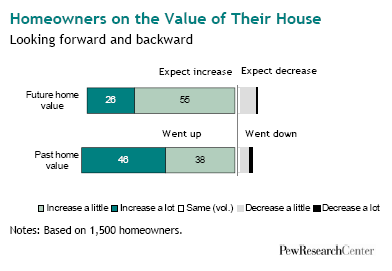 Despite a record drop this past year in the median sales price of existing homes, more than eight-in-ten homeowners expect the value of their homes to go up either “a little” (55%) or “a lot” (26%) in the future.
Despite a record drop this past year in the median sales price of existing homes, more than eight-in-ten homeowners expect the value of their homes to go up either “a little” (55%) or “a lot” (26%) in the future.
However, these anticipated levels of future gains are not nearly as great as the gains that homeowners say they’ve experienced in recent years.
About twice as many homeowners (46%) say their house increased “a lot” in value over the past few years as say they expect similar increases in the future, according to a nationwide Pew Research Center telephone survey of a random sample of 2,000 adults, including 1,500 homeowners, taken from October 18 through November 9, 2006.
Meantime, just 10% say they expect the value of their houses to decline.
This moderated optimism among homeowners comes at a time when there has been a flurry of reports about a housing slump. Last week the National Association of Realtors (NAR) reported that the median price of an existing home sold in October of this year was $221,000, down a record 3.5% from October of 2005.1 It was the third straight month that the industry group recorded a year-to-year decline. Prior to this August, the NAR had not reported such an annual decline since 1995.2
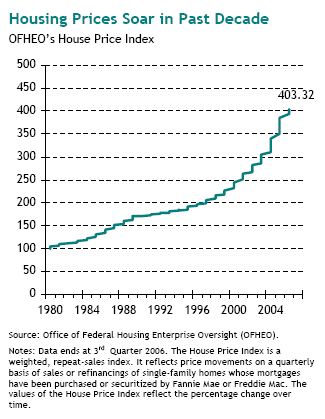 To be sure, these recent declines come on the heels of a record run-up in the value of homes. For example, in the twelve months from October 2004 through October 2005, the NAR reported that housing prices had increased by 16.8%, one of the biggest annual jumps ever.3 And over a longer period, the Office of Federal Housing Enterprise Oversight (OFHEO) reports that single-family homes have risen four-fold in price since 1980 (on a non-inflation adjusted basis), with the sharpest gains coming in the past decade.4
To be sure, these recent declines come on the heels of a record run-up in the value of homes. For example, in the twelve months from October 2004 through October 2005, the NAR reported that housing prices had increased by 16.8%, one of the biggest annual jumps ever.3 And over a longer period, the Office of Federal Housing Enterprise Oversight (OFHEO) reports that single-family homes have risen four-fold in price since 1980 (on a non-inflation adjusted basis), with the sharpest gains coming in the past decade.4
While economists debate whether the recent downturn represents a short-term market correction, a longer-term leveling off or perhaps even the first signs of the bursting of a housing “bubble,” America’s homeowners are not in a panic mode over the softening of the market.
As if to underscore that point, homeowners also report that they’ve largely taken in stride the recent run-up in the value of their home. Only about a quarter say it has had some or a great deal of effect on their personal finances, while about three-quarters say it has had little or no effect.
Other key findings from the Pew survey:
- As homeowners have seen the values of their homes shoot up, many have converted some of this value into cash. According to the Pew survey, some 20 percent of all homeowners currently have a second mortgage or home equity loan. Those most likely to have such loans include homeowners on the younger side (ages 30 to 49) and homeowners with higher incomes and more valuable homes.
- Among homeowners with second mortgages or home equity loans, fewer than half (45%) say they are using the loan money to pay for home improvements or repairs. Another 14 percent volunteer that they are using the money for a second home, a real estate investment or a home purchase. The remaining respondents say the loan is paying for a mixed bag of items: 11% say it is for credit card or other debt; 10 percent say it is for a car; 6 percent say it is for education; 2 percent say it is for business-related expenses and the remainder say it is for other things or that they don’t know.
- About a third of homeowners say that their home accounts for “all or most” of their personal financial worth and another third say it accounts for about half. These figures are unchanged from a similar survey taken in 1992.
- Just under a fifth (18%) of all adults, and just under a quarter (24%) of all homeowners, report owning a second home or other real estate apart from the place where they now live. More than a third (36%) of people with annual incomes of $100,000 and above report owning such real estate.
Housing Values — Looking Backward
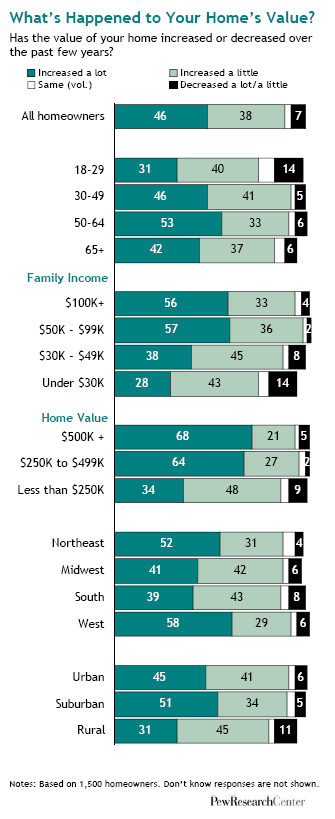 All major demographic groups of homeowners say their houses have gone up in value in recent years, but some say they’ve had bigger bonanzas than others.
All major demographic groups of homeowners say their houses have gone up in value in recent years, but some say they’ve had bigger bonanzas than others.
One key variable is related to the value of one’s home. Among those who say their home is currently worth $500,000 or more, some 68% say their home value has risen “a lot” in the past few years. But just half that share — 34% — of homeowners whose house is worth less than $250,000 say the same thing. By the same token, homeowners with high annual incomes are more likely than those with smaller annual incomes to say their home values have gone up a lot in recent years.
People who live on the nation’s coasts feel more flush about the rise in the value of their home than do those who live in the nation’s midsection. Some 58% of westerners and 52% of northeasterners say their homes have risen a lot in value, while just 39% of southerners and 41% of midwesterners say the same thing.
Suburbanites are a bit more likely that city residents, and significantly more likely than rural residents, to say the value of their homes has risen a lot in recent years. Also, homeowners ages 50 to 64 are more likely than those both younger and older to say they’ve registered big gains in the value of their homes in the past few years.
Overall, the 46% of homeowners who say the value of their homes has increased a lot in recent years is more than double the percentage — 21% — who said the same thing back in May 1992, when a similar nationwide survey was conducted by U.S. News and World Report.
Housing Values — Looking Ahead
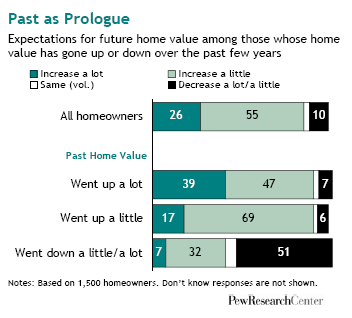 The groups most optimistic about future increases in their home values are those that have experienced the biggest gains in recent years.
The groups most optimistic about future increases in their home values are those that have experienced the biggest gains in recent years.
Among homeowners who say their homes have increased a lot in value in the past few years, nearly four-in-ten (39%) say they expect strong increases in the future. By contrast, among homeowners who say their homes have increased only a little in value in the past few years, just 17% say they expect strong increases in the future. And among the small group of respondents whose home values went down (just 83 respondents), 7% expect big increases in the future while 51% expect further declines.
Along these same lines, those whose homes are currently valued at $500,000 and above are nearly twice as likely as those with homes valued at less than $250,000 to expect strong increases in the coming years.
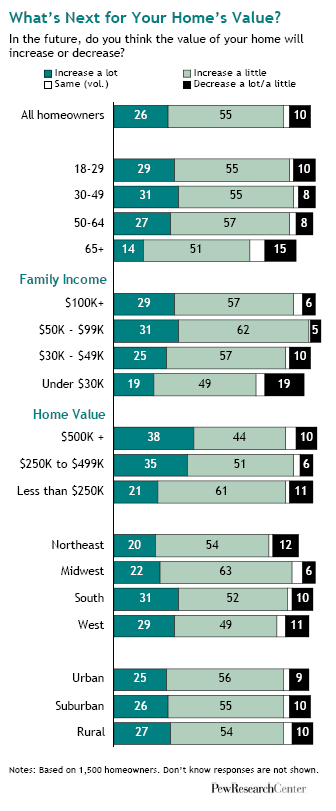
Younger homeowners (ages 18 to 64) are about twice as likely as older homeowners to see big gains in the future value of their homes. Also, southerners (31%) and westerners (29%) are more prone than midwesterners (22%) or northeasterners (20%) to see big gains.
Overall, homeowners today are more optimistic than they were a decade and a half ago about future increases in the value of their homes. Today, some 26% say they expect the value to rise “a lot”; back in May 1992, just 16% felt this way, according to the U.S. News and World Report survey.
Home Values and Personal Finances
Among homeowners who say their home has changed in value in recent years, a majority (52%) say this change has had no effect at all on their financial situation, and another fifth (22%) say it hasn’t had much of an effect. Just a quarter of homeowners say it has had “a great deal” (8%) or “some” (17%) effect.
The January 1992 survey by the U.S. News and World Reports found a somewhat larger percentage (33%) of homeowners saying their home changed in value also saying that changing home values had had an effect on their family finances. Back then, however, 21% of all homeowners said their home values had decreased in recent years; today just 7% say the same thing.
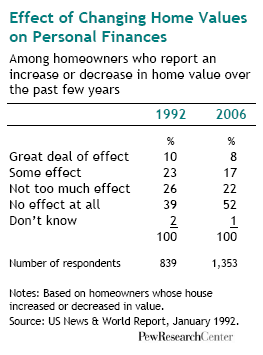
For the vast majority of American homeowners, their home is their most important financial asset. Some 34 percent of homeowners say their home accounts for “all or most” of their personal financial worth and another 34% say it represents about half of their worth.
These percentages are virtually identical to those recorded in the 1992 survey — suggesting that, at least in the eye’s of the nation’s homeowners, the long boom in housing values has not made housing a more significant slice of their overall financial wealth.
Not surprisingly, the more income people have, the less likely they are to report that their home represents a significant share of their personal assets. Also, those homeowners who own and trade stocks are just half as likely as those who don’t to report that their home accounts for most or all of their assets.
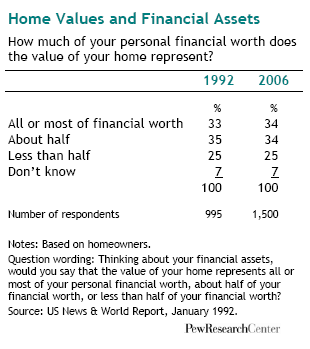
Some Americans are living in homes with considerably higher values than others, of course. Those more likely to report living in homes valued at $500,000 and above include westerners, and those with incomes of at least $100,000. On the other side of the housing scale, those more likely to report living in homes valued at less than $100,000 include rural residents, and homeowners on either end of the age spectrum (ages 18 to 29 as well as those ages 65 and older).
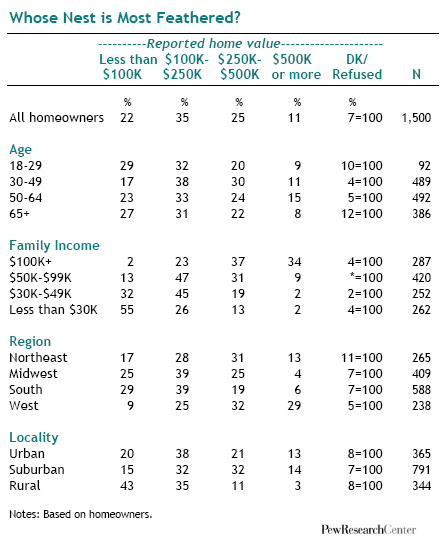
Mortgages, Second Mortgages and Home Equity Loans
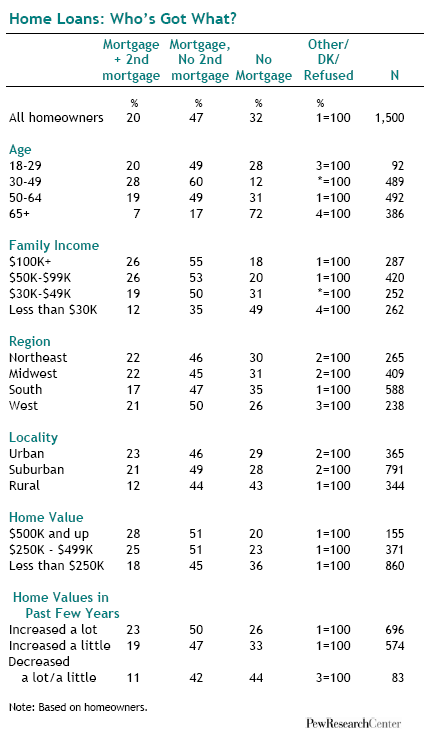 Two-thirds of all homeowners say they are currently paying off a mortgage on their homes. The only sizable group of homeowners who for the most part don’t have mortgages are those ages 65 and older; about one in four of them are paying off a mortgage. By contrast, fully 88% of homeowners ages 30 to 49 have a monthly mortgage.
Two-thirds of all homeowners say they are currently paying off a mortgage on their homes. The only sizable group of homeowners who for the most part don’t have mortgages are those ages 65 and older; about one in four of them are paying off a mortgage. By contrast, fully 88% of homeowners ages 30 to 49 have a monthly mortgage.
One in five homeowners has either a second mortgage or a home equity loan, and this percentage rises to 28% among homeowners in the 30 to 49 age bracket.
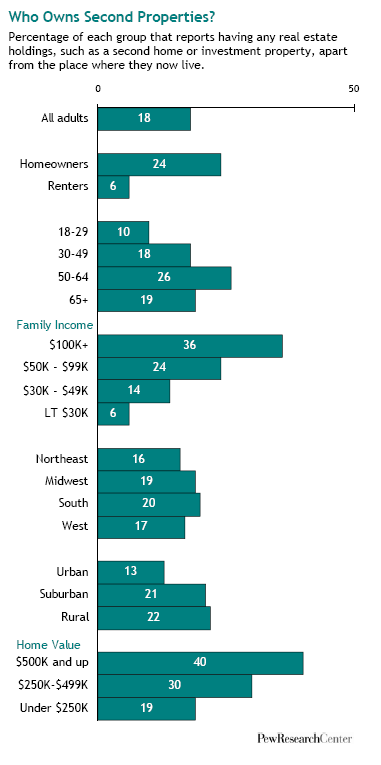 Homeowners with higher annual incomes are more likely than those with smaller annual incomes to have a second mortgage or home equity loan; the same holds true for homeowners with more valuable homes they too are more likely to have second mortgages or home equity loans. Also, those who have seen the value of their homes rise a lot in recent years are slightly more likely to have a second mortgage or home equity loan than are those who have seen their values rise just a little or not at all.
Homeowners with higher annual incomes are more likely than those with smaller annual incomes to have a second mortgage or home equity loan; the same holds true for homeowners with more valuable homes they too are more likely to have second mortgages or home equity loans. Also, those who have seen the value of their homes rise a lot in recent years are slightly more likely to have a second mortgage or home equity loan than are those who have seen their values rise just a little or not at all.
Second Homes
According to the Pew survey, just under one in five of all adults (18%) and 24% of all homeowners have a real estate holding apart from the place where they now live such as a second home or an investment property.
Not surprisingly, those with higher family incomes and homeowners with higher property values are more likely than others to own investment property or second homes.
About this Survey
Results for this survey are based on telephone interviews conducted with a nationally representative sample of adults, ages 18 years and older, living in continental U.S. telephone households.
- Interviews conducted Oct. 18 – Nov. 9, 2006
- 2,000 interviews, including 1,500 homeowners
- Margin of sampling error is plus or minus 2.5 percentage points for results based on the total sample at the 95% confidence level. The margin of sampling error is higher for results based on subgroups of respondents.
Survey interviews conducted under the direction of Princeton Survey Research Associates International. Interviews were conducted in English and Spanish.
Bear in mind that question wording and practical difficulties in conducting surveys can introduce error or bias in the findings of opinion polls.
Read the full report for more details.


